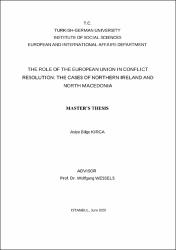The role of the European Union in conflict resolution: the cases of Northern Ireland and North Macedonia
Künye
Kırca, Asiye Bilge (2020). The role of the European Union in conflict resolution: the cases of Northern Ireland and North Macedonia. Türk-Alman Üniversitesi, Sosyal Bilimler Enstitüsü, İstanbul.Özet
Soğuk Savaş sonrası dönemde Avrupa Birliği'nin çatışma çözümündeki arabulucu rolü ivme kazanmıştır. Ortak Dış ve Güvenlik Politikası ve Ortak Güvenlik ve Savunma Politikası’nin kurulmasıyla, AB'nin bu iki dış politika aracı kapsamındaki olanaklarına uygun olarak barış süreçlerine müdahale edebileceği anlaşılmıştır. AB’nin kuruluşu barışçıl bir çözümün simgesi olarak görüldüğünden, AB’nin çatışma çözümündeki rolü varoluşsal bir davranış olarak değerlendirilmektedir. Bu doğrultuda AB, çatışan tarafların AB üyesi olduğu İrlanda çatışmasının çözüm sürecine müdahil olmuştur. Bu çatışmanın çözümünde kullanılan AB araçları, o dönemde sahip olunan kapasiteye bağlı olarak çeşitlenmiştir. Yeni dış politika araçlarının kurulmasından hemen sonraki dönemde AB, Makedonya 'daki çatışmanın çözümünde de arabulucu olarak yer almıştır. Bu çalışmada, AB'nin neden çatışma çözümünde yer alma gereksinimi duyduğu ve müdahalelerinde neden farklılaşmalar olduğuna dair etkili bir cevap bulmak için iki bağımsız vaka analiz edilecektir. Literatürde, AB'nin güvenlik endişeleri nedeniyle çatışma çözümünde rol aldığı ve buna bağlı olarak müdahale derecesinin değiştiği iddia edilmiştir. Bu çalışmada, AB'nin çatışma çözüm süreçlerine katılımının, çatışan tarafların çıkarlarına ve AB’nin barış süreci üzerindeki politikalarının nüfuzuna göre değiştiği incelenmektedir. In the post-Cold War era the EU’s role as a mediator in conflict resolution has gained a strong momentum. The establishments of Common Foreign and Security Policy and Common Security and Defence Policy have meant that the EU may intervene in peace processes in accordance with its capabilities under these two foreign policy instruments. The EU has a role in the resolution process of conflicts since it is an existential behavior of the EU as its creation represents an embodiment of a peaceful resolution. The EU has intervened in the resolution of Irish conflict in which the conflicting parties are members of the EU. The incentives of the EU in the resolution of the Irish conflict have diversified due to the abilities of it at that time. Right after the establishment of new foreign policy tools, the EU has involved in the resolution of the conflict in Macedonia and acted as a mediator in the region. These two distant cases will be analyzed in this study to find a sufficient answer on why the EU involves in conflict resolution and why its involvement’s varies. In literature, it has been asserted that the EU is present in conflict resolution due to
its security concerns and depending on EU’s security perceptions, its degree of involvement varies. This study analyzes the involvement of the EU in conflict resolution processes and their changes according to the interests of the conflicting parties and EU’s leverage on the peace processes.
Koleksiyonlar
- Tez Koleksiyonu [47]

















